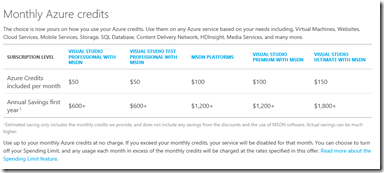Creating a Test Lab for Free in Azure
Almost anywhere you go these days IT folks are talking about "the cloud." It can be kind of intimidating if you haven't experienced it for yourself. To make taking the plunge a little less scary, Microsoft is giving MSDN subscribers monthly credits to use Azure. At the time of this writing Microsoft is giving up to $150 per month credit towards Azure services for MSDN subscribers (Note: Visual Studio Ultimate with MSDN subscribers to be precise).
To see what is currently being offered please use link below:
https://azure.microsoft.com/en-us/pricing/member-offers/msdn-benefits/
Even if you do not currently have an MSDN subscription there is great news. At the time of this writing Microsoft is giving a free 30 day trial of Azure with $200 to spend on Azure Services including Virtual Machines. So what are you waiting for, you have nothing to lose right?
https://azure.microsoft.com/en-us/pricing/free-trial/
Flexible Cost Structure
Now I know you might be thinking that $150 is not a lot but you might be surprised how far you can make it go. At the time of this writing you are able to configure a Basic A Series (A0) Windows Virtual Machine running 1 core and 768 MB of RAM for less than 2 cents an hour (actually 1.8 cents an hour). So if you run that machine 24x7 for the whole month it would cost you a whopping $13.40 which would be deducted from your $150 per month credit. The next step up (an A1 with 1 core and 1.75GB RAM) would cost you 7.4 cents per hour and if you ran it 24x7 it would be $55.06 per month.
There are also beefier configurations that can be used for applications that would require it. The Basic tier which does not include load balancing or redundancy tops out with the A4 which has 8 cores and 14GB of RAM. Jumping up to the Standard tier allows for much more processing power and also adds load balancing and redundancy capabilities. Microsoft just introduced the G-Series for companies that need the horsepower. The beefiest machine currently available is 32 Cores, 448 GB RAM, and 6144 GB SSD storage. Wow! Obviously you will not be running one of those machines with your free credit but it shows what is available out there should your company decide to start using Azure.
For full pricing please visit https://azure.microsoft.com/en-us/pricing/calculator/?scenario=virtual-machines
Only Pay for What You Use
One of the really nice things about Azure is that you only pay for the compute time if the machine is up and running. If you are not using it you can shut it down and save a ton. This is absolutely perfect for test labs since they only need to be running while the testing is being done. Being a support engineer at Microsoft often requires repro work and having lots of different machines of different configurations running various applications.
Creating a Lab Step by Step
I will be creating future writings detailing the steps I used to create a test lab and some of the tricks I use to manage the machines. I am doing this in the hope that you can learn from my mistakes. Early on I made several initially that cost me some time and effort. At the time of this writing I have a small test lab set up that consists of 11 machines.
Below is a list:
1 Windows Server 2012 Domain Controller (Fabrikam.com)
1 SharePoint 2013 Server
1 Exchange 2013 Server
1 Windows 2012 Server (Web Server)
1 Windows 2012 with the ADFS role
1 Windows 2012 Server with the Web Application Proxy role
1 Windows 2012 Server with Rights Management Server role
1 SQL Server
1 Windows 7 client
1 Ubuntu Server (I haven’t seen Linux in so long and this gave me an excuse to do it)
1 Windows 10 Technical Preview Server
Since one of the technologies I am currently supporting is Web Application Proxy (WAP) the above test lab gives me the ability to try out publishing SharePoint, IIS, and Exchange through WAP. All of this is in the cloud and I can hit the published web servers from any client that has an Internet connection. Pretty neat.
Disclaimer: All pricing and offers were valid at the time of this writing and are subject to change at any time by Microsoft.
Note: If the information contained here was useful please let me know in the comments below. Also, if there are any corrections needed or you would like to see future content on a particular subject please let me know that as well. Thanks!
Comments
- Anonymous
March 03, 2015
Hopefully you took advantage of some of the ways in which Microsoft will allow you to try out Azure for - Anonymous
March 11, 2015
This is Part 3 in an ongoing series that will help you take advantage of Azure by showing you how you - Anonymous
November 16, 2015
Hi Keith, good write ups, I was wondering if you had a rough estimate of what the lab cost is vs building (buying) a server at home? Cheers
Mark

